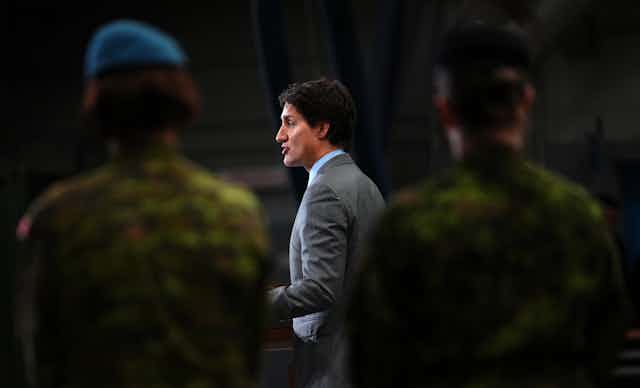Leaked documents from the Pentagon have revealed what many suspected: Justin Trudeau’s Liberal government has no intention of meeting the NATO defence spending target of two per cent of GDP.
The story is hardly surprising — the last time Canadians saw this level of spending was under Brian Mulroney’s Conservative government in 1990.
The report sparked a wave of recriminations over the poor state of Canada’s defence and security funding.
Read more: Justin Trudeau and NATO: The problem with Canadian defence isn’t cash, it's culture
Complaints about the country’s lacklustre spending has become something of a time-honoured tradition. Canadians are told they are ignorant and complacent to the dangers of the world and need to spend more.
But what if we have the script backwards?
What if the problem isn’t public ignorance, but rather a defence and security community that refuses to face some hard truths about Canadian politics?
What if, instead of simply chastising Canadians, we spoke candidly about what may be entirely valid reasons for skepticism?
Confronting these hard truths may just be the first step in building genuine public buy-in for defence spending that has eluded the country for decades.
Threat inflation abounds
For the last two decades, Canadians have seen a variety of defence and security figures dramatically inflate threats well beyond any reasonable point.
We were told Afghanistan was vital to fighting terrorism (it wasn’t), that Iraq had weapons of mass destruction (they didn’t) and that fighting ISIS was the “greatest struggle of our generation” (not even close). But when the dust settles and these claims are revealed to be suspect, it’s understandable why the Canadian public might be skeptical.
The uncomfortable truth is that for many in the defence and security community and others who offer commentary — including journalists, politicians and pundits — there are strong incentives for dramatic language and apocalyptic visions because it drives clicks and boosts profiles.
But at the collective level, they can cause a credibility deficit that hurts their ability to speak to the public.
Afghanistan’s lessons
With a considerable cost in blood and treasure, the Afghanistan mission is a bitter memory for many Canadians. Despite these sacrifices, Canada never received the recognition it craved from NATO allies.
That’s why it’s not surprising that in 2012, 69 per cent of Canadians believed the mission was “not worth the human and financial toll.” With the Taliban’s eventual takeover of the country, that number is likely even higher.

The lesson learned for a generation of Canadians is that there are limits to contributing to NATO simply to appear as a “good ally.”
The fact that we’ve embraced a polite national silence and never had any real accountability for the failures in Afghanistan is a lingering disappointment. Now add to this a string of cringe-worthy procurement failures and utterly disgraceful sexual misconduct in the military.
Is it any mystery why some question whether this system is worthy of more money?
Read more: What's taking Canada's Armed Forces so long to tackle sexual misconduct?
Cost-of-living crisis
In 2022, food bank use was at an all-time high in Canada. Homeless encampments are an increasing feature of our cities. And now the average rent in Toronto, the country’s largest city, has crossed the $3,000 threshold.
The reality is that the cost-of-living crisis is a political juggernaut with no signs of abating.
For much of the Canadian public, this is by far the biggest priority. That leaves little bandwidth for increased defence spending.

Meanwhile, the prime minister’s residence is crumbling into a rat-infested, mouldy death trap. The plane the prime minister uses is so old the seats were designed with ashtrays in the arm rests.
We live in a country where the taxpayer is considered sacred and any even remotely questionable spending is considered profane.
That means that unless it serves a very specific constituency, some spending is often not worth the risk of criticism for politicians.
Addressing what matters to Canadians
Meanwhile, other immediate issues like the effects of climate change are top of mind. More than 500 Canadians died from the 2022 heat dome in British Columbia alone.
Politicians and pundits can discuss cyber security all day long, but it won’t mean much to someone whose roof was just ripped off in the latest derecho.
If politicians can’t speak to how Canadians actually feel and experience insecurity, citizens won’t listen to them on defence and security issues.
That doesn’t mean public buy-in for increased defence spending is impossible. But there must be political leadership that speaks candidly to the concerns and skepticism of Canadians.
It means there needs to be real and meaningful progress on transparency and accountability — at all levels. It means exercising restraint and not sensationalizing every single danger in the news cycle. It means speaking to how Canadians actually feel and experience insecurity, rather than simply telling them what it means.
We can do all of this and more. Or we can go back to naively admonishing Canadians for not spending enough on defence and security. We already know how well that’s working out.

